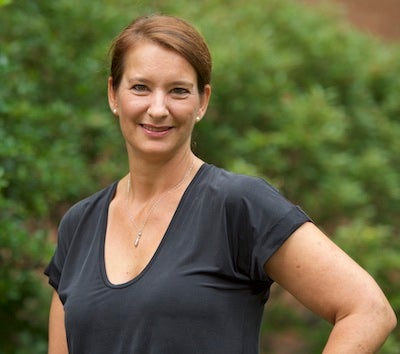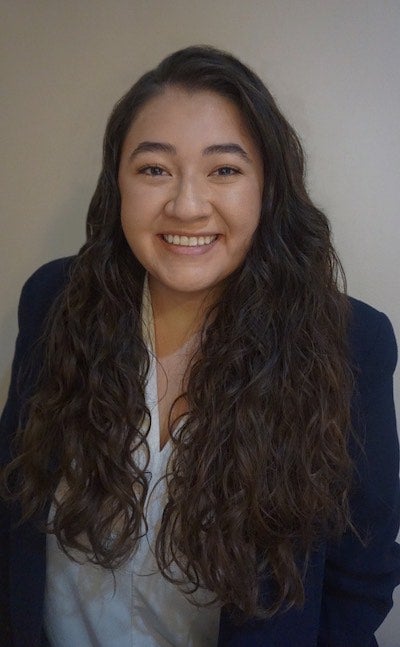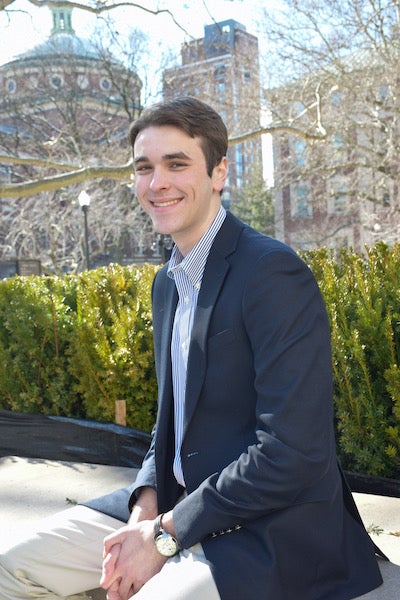Global Health Seniors Complete Virtual Internships at Well-Known Organizations
October 1, 2020 – During their fall semester, seniors in the global health major at the School of Nursing & Health Studies typically complete a 12-credit research practicum abroad.
Because of the COVID-19 pandemic, students are currently not able to participate in this experience. To help address the situation, the Department of International Health developed options for seniors, said Dr. Myriam Vučković, associate professor and director of the undergraduate program.

Seniors could choose to write their scholarly research paper this semester through a course directed by her colleague Dr. Wu Zeng, associate professor, and take their internship course taught in the spring by Dr. Eva Jarawan, assistant professor. Or they could do the reverse.
If they opted for the latter route, students are now enrolled in the three-credit internship course, which Vučković is teaching for 11 seniors. Fifteen others will take the course with Jarawan next semester.
“I didn’t really know what to expect because obviously we’ve never done the internships virtually except in March,” she said, noting the move to virtual instruction this past spring semester. “All the organizations were quite accommodating since they also went virtual.”
‘Invaluable Experience’
“All the organizations we have as partners – which are mainly international organizations, consultancies, or NGOs – they are all working from home,” Vučković noted. “So in that regard, it turned out not being so difficult because everything is virtual anyway. So yes, it is a different experience than going into an office, but the whole organization has that experience, not just our students who are interning with them.”

Vučković said the students are currently interning with preceptors at various well-known organizations, including the Elizabeth Glaser Pediatric AIDS Foundation, Management Sciences for Health (MSH), the Pan American Health Organization, the Population Reference Bureau (PRB), RTI International, and the World Bank.
Nina Garcia Wright (NHS’21) is interning at PAHO and said she has enjoyed the opportunity to put into action what she has learned so far in the major.
“As their health emergencies intern, I have been working with the Emergency Medical Team Unit on preparedness and response to a series of medical emergencies including COVID-19,” she said. “Much of my work is programmatic, including the creation of data visualization and dissemination for medical teams across the Americas.”
Wright added: “Our team focuses on assisting emergency medical teams in the response of health crises and preparedness of alternative medical sites. So far, I have loved the experience and am very grateful to have the opportunity to work at PAHO. Being able to apply my coursework in global health from the last three years and expand my learning and understanding of international development has been an invaluable experience.”
Experiential and Reflective Learning
During the 12 hours they spend weekly in the internship setting, Vučković said, students have the opportunity to grow professionally, learning how to navigate office culture, network, work as a part of a team, and see how global health initiatives occur within a workplace setting.
In addition to those hours, Vučković spends time with the students each week in the virtual classroom, helping situate their internship experiences within broader thinking around areas such as project evaluation and management, planning models, and stakeholder engagement. Students also engage in case studies and group work.
“This is something that normally I do with them during a two-day workshop when we teach this class in person in the spring,” Vučković added, noting that she has adapted the syllabus structure to be more virtual learning-friendly.
Students are blogging about their experience and are reading John Kotter’s Our Iceberg Is Melting, which she hopes will inspire them to think about how to “effect change.”

Additionally, Beth Martin Harlan from the Cawley Career Education Center will speak with the seniors about “Career Contemplation in Action.” “She does an exercise to discern what are your strengths, your weaknesses,” Vučković said. “What do you really like? What kind of job, what kind of environment would you like to work in?” Lastly, the professor has invited program alumni to engage with current students in November about career pathways.
This particular class is an Engelhard Project course, according to Vučković, which seeks to make an explicit link between student health and wellbeing and curricular content. (Learn more about the Engelhard Project at Georgetown.)
‘Global Health Landscape’
Matthew Chakwin (NHS’21) is working at Management Sciences for Health as a pharmaceutical economics and decision sciences intern.
Commissioned through the USAID Medicines, Technologies, and Pharmaceutical Services Program, the working group that Chakwin is on is conducting “research on health technology assessment, which is a systematic priority setting process for resource allocation and decision-making for health interventions.”
The experience has given him the opportunity to adapt surveys to interview guides and to conduct a thematic analysis of survey-based data. He is also collaborating on a manuscript to be shared with the USAID program and for future publication.
“It has been incredible that through this course I have been able to get a placement related to my area of interest in pharmaceuticals and to apply my coursework knowledge directly to emerging fields in the global health landscape,” he said.
By Bill Cessato
